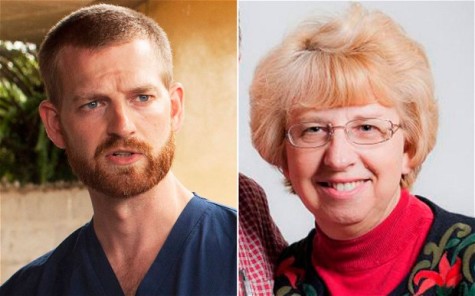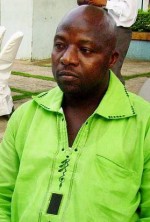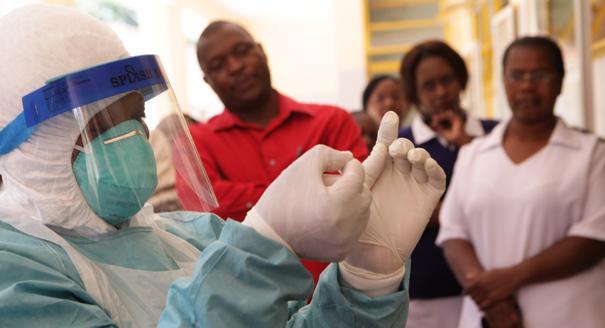Deadly Killer Claims Thousands
Levine, Susan. “American Aid Worker Exposed to Ebola Coming to NIH.”POLITICO. N.p., 27 Sept. 2014. Web. 28 Sept. 2014.
Over the summer, the Ebola virus has taken a turn for the worse. As of right now, several Americans have been infected. The first few hospitalized, Dr. Kent Brantly and Nancy Writebol, are now back to healthy living; Dr. Rick Sacra is currently still in the hospital and looking to make a full recovery shortly, and the fourth unfortunate victim is the now deceased, Thomas Eric Duncan.
Duncan was being treated in a Dallas hospital after coming back from Liberia on September 19th. Once returned to the states, the man never experienced any symptoms for four to five days and went to the hospital immediately after symptoms began to show. The hospital sent him home and he was only hospitalized and isolated after he was sent in on an ambulance, having had contact with up to 100 people since returning to the States. Duncan died on Wednesday, October 8th after Dr. Kent Brantly had donated his blood to help save him.
Both the nurse looking after Duncan and a homeless man who rode in the same ambulance have been diagnosed with Ebola. Nina Pham, Duncan’s nurse, contracted the disease despite wearing complete protective gear while treating him. Brantly has once again donated his blood to Pham.

An NBC freelance cameraman working on the Ebola case, Ashoka Mukpo, tested positive on October 2nd. Both he and Thomas Eric Duncan are/were being put on different experimental treatment. A company from North Carolina are now approved to administer a drug called Brincidofovir, a medication that successfully treated Ebola in the lab.
160 soldiers from Fort Carson, Colorado, will be sent to Liberia in late October in order to supervise construction of Ebola treatment units.
Ebola screening tests are now being enforced all over the world including major airports such as Heathrow, Gatwick, and JFK.

So what is Ebola? Ebola, previously known as Ebola Hemorrhagic Fever, is an infectious and generally fatal disease marked by fever and severe internal bleeding. It is important to note that it can only be transmitted through direct contact with the bodily fluids of sick people.
Americans probably don’t have to worry for now. The latest outbreak of this virus was located in West Africa, affecting places such as Guinea, Sierra Leone, Liberia, and Nigeria.
The first ever identified case of Ebola was on August 26, 1976, in The Democratic Republic of Congo. There were 318 cases and 280 deaths due to the virus, making it an 88% fatality rate. The next reported case was in 1995, also in The Democratic Republic of Congo, with 315 cases and 254 deaths. An outbreak in 2003 had a 90% death rate, which was higher than the next outbreak in 2007. There were many others up until early 2014.
In March of this year, The World Health Organization reported that the first outbreak was in Guinea and by August 8, it was declared an international public health emergency with around 2,000 reported cases and just above 1,000 deaths. By mid October, the estimated number of cases was 8,914 and the death toll at 4,447, the largest it has ever been.
According to www.cdc.gov/, here are some hints for staying protected if you are traveling in or near the areas of infection:
- Practice careful hygiene. Avoid contact with blood and body fluids.
- Do not handle items that may have come in contact with an infected person’s blood or body fluids.
- Avoid funeral or burial rituals that require handling the body of someone who has died from Ebola.
- Avoid contact with bats and nonhuman primates or blood, fluids, and raw meat prepared from these animals.
- Avoid hospitals where Ebola patients are being treated. The U.S. embassy or consulate is often able to provide advice on facilities.
- After you return, monitor your health for 21 days and seek medical care immediately if you develop symptoms of Ebola. [1]
If you or anyone you know will be traveling to West Africa in the short future then you should definitely take these steps to prevent you or your friend from getting sick. The overall fatality rate of Ebola is 53% and is definitely not an easy recovery, if any at all.
[1] http://www.cdc.gov/vhf/ebola/prevention/
[2] https://thejetstreamjournal.com/2946/in-depth-articles/ebola-isnt-just-reston-anymore/

I am the Senior News Editor for The Jetstream Journal. I currently have blue hair and an irrational fear of red vegetables. I'm not involved in any other...













Cody Maynard • Oct 15, 2014 at 4:14 pm
Emma, great article and an even better angle. I love how the title focuses on the “actual deaths” and not just the fear of Ebola spreading throughout the US.